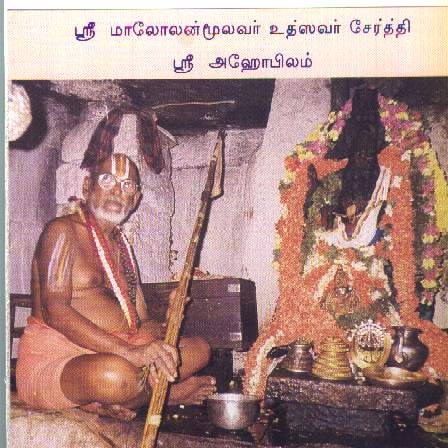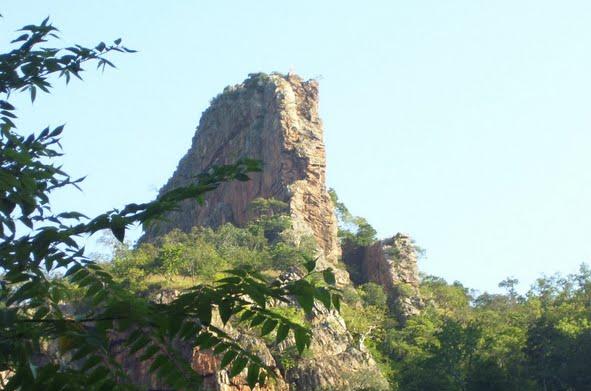GITA 7.30
sthithE manasi susvasthE sarIrE sathi yO nara:
dhAthusAmyE sthithE smarthA visvarUpam cha maamajam (1)tathastham mriyamANam thu kAshtA paashaNa sannibhamaham smarAmi madh bhaktham nayAmi paramAm gathim (2)
This is Sri Varaha charama sloka. When our body, mind, intellect and vital organs are properly functioning and in our control, if we surrender at the Divine feet of Sri Varaha Perumal, then, when we are in our death bed, when we can not even remember His name nor our body and mind are in our control, Sri Varaha Perumal assures that He would remember and with a helping hand would take us to Moksham. Even when we lose our memory, the Lord says He would remember and guide us to Moksham. The Lord graces in Ahobilam as Sri Varaha Narasimha.
 |
| SRI VARAHA NARASIMHA SANNIDHI |
Today’s [17th April, 2008] lecture is from His sannidhi. Near this place is the sannidhi of Swami Ramanuja, in a small cave. Swami Ramanuja had visited Ahobilam.
 |
| SRI RAMANUJA |
With the blessings of Lord Sri Narasimha, he published his Sri Bhashyam, commentary on Brahma soothram, by Veda Vyasa. Inside we have the Lord as Sri Varaha and Sri Narasimha.
 |
| SRI VARAHA AND SRI NARASIMHA |
Both are the Lord’s avatar to kill the demon brothers Hiranyaksha and Hiranyakasipu. Unlike in many other places, Sri Varaha Murthy is not large and like in Sri Mushnam, the size is compact. As the great Boar, the Lord entered the ocean to rescue His Consort Sri Bhoodevi. Here we can see Sri Bhoodevi sitting on His long nose, as rescued. Normally, we see the Globe on His nose, but here the Thayar Herself is seated. Nearby is Sri Narasimha. Alwar says Sri Varaha is with strong teeth [to carry Sri Bhoodevi] and Sri Narasimha with sharp teeth [to tear off and kill Hiranyakasipu]. We will now see the 24th sloka of Seventh Chapter:
avyaktam vyaktim apannam
manyante mam abuddhayah
param bhavam ajananto
mamavyayam anuttamam
manyante mam abuddhayah
param bhavam ajananto
mamavyayam anuttamam
"Unintelligent men, who do not know Me perfectly, think that I, the Supreme Personality of Godhead, Krishna, was impersonal before and have now assumed this personality. Due to their small knowledge, they do not know My higher nature, which is imperishable and supreme."
Avyaya = never diminishing [in His greatness], anutthamam = with no equal or greater, mama = My [Sri Krishna’s], param bhavam = very great quality, ajanantha = is not understood or unaware of. Millions and millions of people are ignorant of His greatness. People are unaware of Shastras or God or atman. They are ignorant that the Lord is the King of Vaikuntha, He is the Lord of Ubhayavibhooti; He is the Creator; He is the repository of all auspicious qualities; He is the Consort of Sri; He is the motive Force in all; He is the Supreme Lord. They do not know that the Lord is so great. Not only that. They also have misunderstood Him. Avyaktham vyakthi apannam manyata = [they think] the Lord is born because of good deeds in the past [by Him]. We all have got this human birth because of our past good karma. Similarly, these people think that Sri Krishna might have done good things in the past and so He is born as Sri Krishna now! His supernatural feats like hoisting Govardhana giri or killing many demons are not considered as His great qualities, but He is regarded as a normal human being. There are many ordinary persons who possess certain superhuman powers and Sri Krishna could be like that. Abuddhaya = foolish people, mam manyante = consider Me [Sri Krishna]. They do not realise that Sri Krishna is born, not like us because of our past karma, but out of His own freewill and determination [sankalpam]. This has been clearly explained in Chapter 4. He appears in this world out of His compassion and nothing can force Him to take avatar. He has neither an equal nor a superior. Sri Krishna is not realised as Paramatma but regarded as another person like us. They are fools. Arivinaal kuraivilla, says Alwar, which might suggest that we have enough intellect. But Swami Nampillai, in his Eedu [commentary on Divya prabhandam] says that not only we are ignorant about Him and His greatness, but we are unaware of this ignorance also! Kimapibrahmatat kishora bhava dhrushyam- Swami Vedanta Desika says in his Gopala vimsati. He was born among gopis and gopikas. He was chided and made fun of. Now everyone thinks that He is, after all, a gopi and never for a moment think He is the Para Brahmam. They do not think that such great Person has come down to us out of compassion. Our karma has made us ignorant of this. This ignorance, however, does not belittle Him. If we correctly understood Him, then we will not seek anything from anybody else. Just like here, in Simhachalam also the Lord graces as Sri Varaha Narasimha.
(continued)










